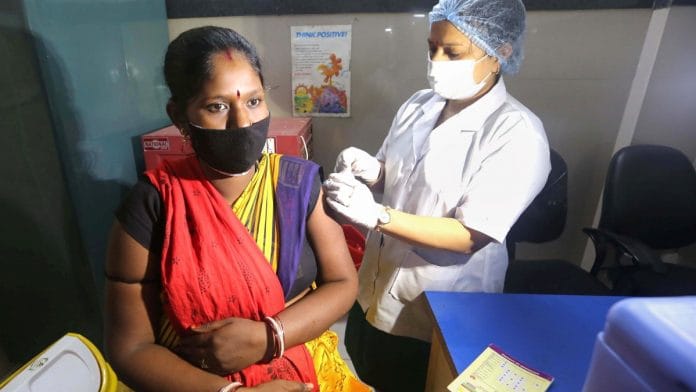New Delhi: A booster dose of Covaxin can increase antibody levels against SARS-CoV-2 variants “19 to 97 fold” compared to its mandated two-dose schedule, according to results from the indigenous vaccine’s Phase 2 clinical trials.
The study, which is yet to be peer-reviewed, was published on the preprint portal medRxiv Saturday.
Conducted by the Hyderabad-based Bharat Biotech and the Indian Council of Medical Research (ICMR), which co-developed the vaccine, the study sought to analyse immune responses in people who received the third dose of the vaccine six months after receiving its two-dose regimen. It had 184 participants.
Phase 2 of a vaccine’s clinical development involves a larger group of subjects than the first phase, as well as those who “have characteristics (such as age and physical health) similar to those for whom the new vaccine is intended”. This is followed by Phase 3, when “the vaccine is given to thousands of people and tested for efficacy and safety”.
The wide range of “19 to 97 fold” seeks to cover the antibody response against different variants. The study covered the Alpha, Beta, Delta and Delta-plus variants of the virus.
The booster dose reportedly led to an increase in the response of the T cells — a type of white blood cells that plays an important role in cell-mediated immune response.
Cell-mediated immune response helps the body “remember” a pathogen for a longer term and recognise it when the body is under attack.
“This may allow Covaxin to confer long-term protective efficacy against severe SARS-CoV-2,” the researchers added.
“These trial results provide a strong foundation towards our goal to provide Covaxin as a booster dose. Our goals of developing global vaccine against Covid-19 have been achieved with Covaxin indicated for adults, children, 2-dose primary and booster doses,” Bharat Biotech Chairman and Managing Director Krishna Ella said in a statement.
The results of the trial come just ahead of India’s next phase of vaccination, where healthcare workers, frontline workers and those above the age 60 and with comorbidities will be offered a third dose of the vaccine if they have completed nine months since the second dose. The phase starts Monday.
‘High protection against severe disease for 6 months’
The study also reportedly found that 90 per cent of recipients had a detectable neutralising antibody response against the original SARS-CoV-2 strain six months after the second dose.
According to the researchers, they detected durable neutralising, and T and B cell responses, which suggests good immune memory responses and long-term protection from severe disease.
While protection against severe disease remains high across the full 6 months, a decline in efficacy against symptomatic disease over time and with the continued emergence of variants is expected, Bharat Biotech said in the statement.
(Edited by Sunanda Ranjan)
Also Read: Covaxin doses 86% effective against symptomatic reinfections in health workers: AIIMS study






